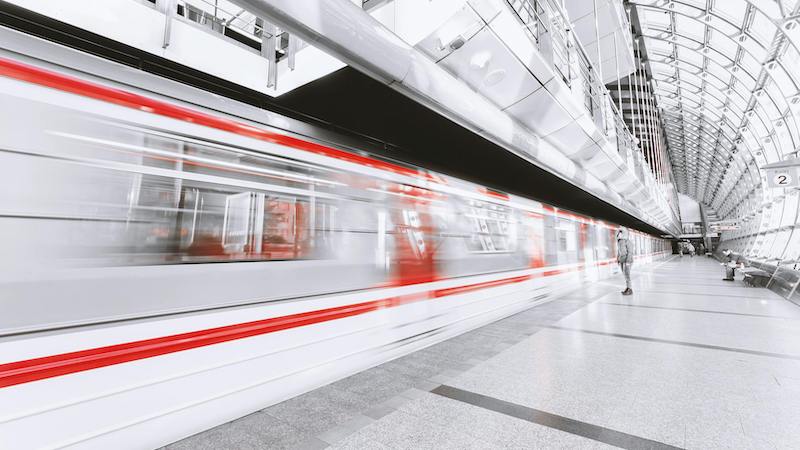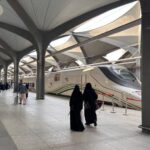By samriddhi vij
The Gulf Railway Mission (GCC Railway) has ambitiously tried to develop a transnational infrastructure plan to hyperlink all six Gulf Cooperation Council (GCC) member states by way of a 2,177-kilometre rail community. Conceived in 2009, the railway is designed to run from Kuwait Metropolis to Muscat, passing via Saudi Arabia, Bahrain, Qatar, and the United Arab Emirates (UAE). This undertaking, whereas transporting each passengers and freight, can facilitate larger financial integration, provide chain resilience, and inexperienced mobility throughout the Gulf.
The undertaking is strategically vital for a number of causes. The Gulf Railway can develop because the spine of a future GCC customs union, growing intra-GCC commerce, which is roughly 10 % of complete exports. That is considerably decrease than financial blocs just like the European Union (EU), the place over half of tradeoccurs throughout the bloc for each items and providers. Thus, the GCC railway undertaking can allow a progress in intra-regional commerce by overcoming connectivity limitations and complementing ports to spice up regional competitiveness. Past the area, the undertaking also can strengthen GCC’s geoeconomic positioning by linking seamlessly with transnational corridors just like the India-Center East-Europe Financial Hall (IMEC). These hyperlinks might elevate the GCC as a central node in Eurasian connectivity, lowering East-West commerce dependence on conventional maritime chokepoints just like the Strait of Hormuz and Bab el-Mandeb, typically threatened by geopolitical instability, thereby enhancing commerce and logistics continuity. This initiative additionally builds on the ambitions of Gulf economies to diversify away from oil by presenting a low-emissions logistics spine that aligns with their net-zero ambitions. Etihad Rail states its rail transport can cut back street emissions by 21 % yearly by 2050, taking as much as 300 vehicles off the roads for each prepare journey and eradicating 8.2 million tonnes of CO2 per yr.
Whereas the advantages of the GCC railways undertaking are multifold, with vital spillover advantages for all the Gulf, its implementation has been derailed and has been stalled for over 14 years. This paper goals to determine the important thing the reason why the undertaking’s progress has been stunted and provide options to speed up its implementation.
Progress on the Gulf Railway has been uneven, with the UAE and Saudi Arabia advancing furthest, whereas Kuwait, Bahrain, and Oman have confronted essentially the most vital delays. The UAE’s Etihad Rail has efficiently linked the Saudi border to Fujairah via all seven emirates, establishing the primary operable reference to one other GCC state. Oman and the UAE signed a landmark settlement in 2023 to launch a three way partnership known as Oman–Etihad Rail Firm, tasked with linking Sohar and Abu Dhabi in 100 minutes. Saudi Arabia has developed in depth home rail infrastructure, however its segments instantly contributing to GCC integration, akin to connections from Dammam to Al-Jubail and from Al-Khafji to Kuwait, are nonetheless beneath growth. Qatar has already constructed a contemporary rail community assembly GCC requirements, however stays unconnected to the broader system. Bahrain has made much less tangible progress; it has no nationwide railway and is just planning for a gentle rail system. The deliberate Friendship Bridge between Bahrain and Qatar stays at pre-construction phases. Oman is but to interrupt floor on its 2,135 km nationwide railway community. Most cross-border segments—together with Saudi-Qatar, Saudi-Kuwait, Qatar-Bahrain, and Bahrain-Saudi—stay both in early planning or stalled, undermining the GCC Railway’s objective of seamless regional integration.
Whereas the strategic logic of the Gulf Railway is powerful, the undertaking has confronted extended delays because of a mixture of conceptual, political, and monetary challenges. Conceptually, the Gulf Railway’s supranational nature requires intense coverage harmonisation, together with customs, rules, technical requirements, and border management agreements—none of which have saved tempo with development. For instance, questions stay round who will function the trains throughout nationwide borders, how cargo will likely be cleared at borders, and whether or not the rail will get pleasure from regulatory fast-tracking like airports and ports.
These conceptual hurdles are additional compounded by political points just like the 2017 Qatar disaster, when sure GCC states reduce ties with Qatar, severely disrupting regional planning. Though ties have been restored in 2021, the rift led to the suspension of Qatar’s section, delaying funding and planning throughout a number of states because of lacking cross-border connectivity.
Along with this, monetary challenges have additionally stalled the progress of the undertaking. Preliminary price estimates for the total undertaking hovered round US$250 billion, however no unified GCC fund was established to underwrite it. Wealthier states just like the UAE and Saudi Arabia have pushed forward independently, whereas Kuwait, Bahrain, and Oman have confronted fiscal constraints, particularly post-2014 oil worth crash and through COVID-19. Additional, the railway competes with nationwide ambitions such because the Qatar World Cup and NEOM, which may divert funding away from railways. Smaller international locations like Bahrain additionally view rail as a decrease precedence than airports, metros, or roadways that serve fast home wants.
To fast-track the completion of the GCC Railway, the area should undertake a multi-pronged strategy rooted in supranational governance, modern financing, phased infrastructure technique, authorized frameworks and public-private partnerships.
First, whereas the institution of the GCC Railways Authority (GCCRA) in 2021 was a optimistic step towards institutional coordination, its function should now evolve past coordination into enforcement. The authority must be empowered to mandate compliance with unified technical requirements, development milestones, and cross-border protocols, very like the European Union’s European Railway Company (ERA), which enforces the Trans-European Transport Community (TEN-T) with binding deadlines. With out this enforcement capability, progress will stay piecemeal and topic to shifting nationwide priorities.
Second, equally vital is the creation of a devoted GCC Railways Fund. Presently, every nation is anticipated to finance its portion of the railways. Nevertheless, by pooling monetary assets from wealthier member states just like the UAE and Saudi Arabia and supplementing them with concessional finance from establishments such because the Islamic Improvement Financial institution or the Asian Infrastructure Funding Financial institution, the fund can assist fiscally constrained members like Bahrain, Kuwait, and Oman. It will likely be vital to remind wealthier contributors that the railway’s completion enhances all the area’s commerce competitiveness and geoeconomic clout, and thus justifies a redistributive financing mechanism.
Third, a phased strategy to development also needs to be adopted. Drawing on the East African Railway Grasp Plan, the GCC can prioritize high-impact segments, such because the UAE–Oman hyperlink from Abu Dhabi to Sohar, the Saudi–UAE–Qatar route by way of Salwa, and the Kuwait–Saudi Arabia section from Nuwaiseeb to Al-Khafji, as anchor corridors that reveal early success, appeal to customers, and construct momentum for additional integration. These segments serve vital industrial hubs and ports, aligning intently with the GCC’s freight-driven logistics profile. Specializing in freight providers first, relatively than lesser viable long-distance passenger routes, may also be important.
Fourth, accelerating authorized and regulatory harmonisation is important. ASEAN’s Singapore–Kunming Rail Linkprovides a very good mannequin of how authorized protocols, akin to customs clearance, operator licensing, and cargo inspection, might be standardised even amongst numerous states. The GCC should fast-track its personal set of harmonised rules, together with a digital customs platform and shared security benchmarks, ideally beneath the management of the GCCRA, with mutual recognition of requirements. This mushy infrastructure is as important because the bodily rail strains in unlocking operational effectivity.
Lastly, Public-Non-public Partnerships (PPPs) also needs to be actively pursued, notably for freight corridors. This requires clear bidding processes and performance-based contracts by drawing from fashions in China and North America, the place industrial freight operations operate properly beneath public oversight.
The GCC ought to leverage rail diplomacy to rebuild belief and institutionalise cooperation. The 2017 Qatar disaster revealed how political fragmentation can derail regional infrastructure. Common ministerial-level summits on transport, modelled on the 2024 Doha GCC Railway Assembly, must be held to observe progress, resolve disputes, and reinforce shared dedication. Railway integration must be positioned as a strategic instrument for regional unity, financial safety, and diversification past oil.
By studying from world fashions, the GCC can remodel the Gulf Railway from a delayed ambition right into a connectivity spine. The imaginative and prescient already exists, however what’s now wanted is a larger institutional will.
Concerning the creator: Samriddhi Vij is an Affiliate Fellow, Geopolitics, on the Observer Analysis Basis–Center East.
Supply: This text was printed by the Observer Analysis Basis






![The Kingdom Tower is seen at sunset in Riyadh, Saudi Arabia on 02 March, 2024. [Jaap Arriens/NurPhoto/Getty Images]](https://www.gccrailway.com/wp-content/uploads/2026/02/GettyImages-2189446856-150x150.jpg)